Ever since the trio of drummer Alex Kerns, guitarist Sheena Ozzella, and bassist Adam Vernick burst out of Buffalo in 2004, Lemuria has been one of the American indie underground’s hardest working and consistently rewarding bands. From the start, the band hit the road and never looked back, unleashing a flurry of 7-inches and EP’s and earning the admiration of the punk scene for their work ethic and unwavering commitment to DIY ideals. “When we were on tour together,” recalled Mikey Erg back in 2005, “those guys would get up at dawn, dumpster dive breakfast, feed the homeless, then go downtown and beat up some Nazis, and be back to wherever we were staying before the Ergs got out of bed.”
Vernick didn’t last long, and over time Lemuria would change bassists several more times, but the team of Kerns and Ozzella would become true force in American punk rock, with an ever-evolving sound that combined sweet melodies with ruminative lyrics and innovative time signatures. (The current lineup includes Max Gregory on bass and sometimes keyboardist Tony Flaminio.) The band quickly became a favorite of the mid-00’s pop-punk revival, appearing several times at Insubordination Fest and releasing an album on Asian Man. The band then surprised its fans and the industry by signing with Bridge 9, a label known for brutal, metal-tinged hardcore, for two albums. The group’s latest release, Recreational Hate, originally dropped unannounced as part of a package sent to fans, then self-released in February, 2018. The album continues the band’s evolution towards melody and lyrical sophistication; it owes more to Fleetwood Mac, Yo La Tengo, and Superchunk than to anything the average fan would label “punk,” however one defines that term in 2018. Lemuria worked with veteran industry producer Chris Shaw on some tracks, and old friend (and post-hardcore legend) J. Robbins on others. It’s hard to tell which producer crafted each track, but the addition of strings and horns augments rather than blunts the band’s power, and Kerns and Ozzella trade vocals like two giddy kids who just learned how to sing together, not hoary 14-year veterans of unending tours and a seemingly endless list of singles, EP’s, and compilation tracks.
Ghettoblaster: If I knew nothing about your history and only listened to the new album, I would never label Lemuria a punk band and yet you continue to tour with acts like the Menzingers and Mikey Erg who are firmly of the pop-punk scene. Is that dichotomy ever troubling?
Alex Kerns: In 2004, we played mostly shows with hardcore bands, because Sheena and I had both played in hardcore bands prior to Lemuria forming. I would say the root of us being connected into the next generation/Lookout! pop-punk scene would be when we got a call from the band Delay asking us to come play their house in Columbus, Ohio. Delay brought a lot of bands and people together. Probably the 3rd or 4th time we played one of the houses in Columbus was with The Ergs! From there, The Ergs! would have us come down to New Brunswick, NJ frequently and we became very good friends and eventually toured the full US together.
Anyway, none of that really answers your question. We’ve never really tried to brand ourselves to any genre. Sheena and I have always just worked with what we know. We’ve been best friends for 20 years now. You’ll find our releases on hardcore label Bridge 9, ska label Asian Man Records, bearded gruff punk No Idea, pop-punk Whoa Oh Records, etc. We’ve toured with everyone from Aimee Mann to Against Me!. We like to tour with our friends and the family we’ve inherited through music over the years. If a big indie, folk or pop band invited us to open for them on tour, we’d do it. There isn’t any band I can think of where if we toured with them, we are going to win over the whole room. We’ve just slowly been building our audience of people who may want to hear a pop song with depressing lyrics and an 11/4 time signature.
GB: On the same theme, Lemuria has always been fiercely DIY. At this point in your career, most bands would be looking to “move up” to a large indie yet you went in the opposite direction and released this new album by yourselves. Is it still possible for a DIY band to reach larger audiences and book bigger venues without the business machinery of the industry behind you?
AK: The music industry has changed so much since we started. The standard record label deal, indie or major, is going to want to split 50/50 profits on everything for eternity. This includes digital download and streaming sales, which make up almost all of our profits as a band. Everyone in the band has lived in different time zones for almost a decade now so we need to be careful with money to assure we can cover all of our travel expenses.
Record labels typically work an album for the year it is released, then it rests on shelves and hopes that the band stays together and keeps touring. Paying out 50% of everything we make until the end of time to a record label really isn’t sustainable for us. If you’re a new band, record labels can be a huge help because you can inherit their PR team, etc.
We’ve been a band for 14 years now, so instead we assembled our own team of people we’ve worked with in the past and pay them a flat rate for their job, which will save us a ridiculous amount of money over the years to come. This team we assembled also includes the record labels Asian Man Records and Big Scary Monsters. Instead of having them fund the album, we self-funded it and then licensed the release to them. So when the album was officially released on February 2, they distributed the album and the label amenities they offer are for the most part still there. The money we didn’t borrow from them at the start of the album preparation allows us to keep that 50% digital sales forever. We’re simply keeping complete control of our music now and the extra money we save is filtered back into recording more music, touring to more countries, making more music videos and plenty of other things we’d like to do as a band.
GB: How many days a year do you estimate that you’re on tour? Now that you’re a decade older than when you started, do creature comforts play a larger role than when you were sleeping on strangers’ floors or crammed into some youth hostel every night?
AK: We used to tour about 4 months of the year, but not nearly that much anymore. We’re not opposed to touring more, but we still have our jobs at home. We love to tour, especially to places that we would probably not have the opportunity to go to otherwise, like Indonesia, Malaysia, Thailand, Russia and Ukraine which we did a few years back. Sleeping scenarios has become more comfortable over the years because a lot of our friends we’ve made on the road no longer live in squats or punk houses, but now have homes with guest bedrooms. Sometimes we still sleep on the floor, but all three of us enjoy tent camping, so it’s not something that bugs us.
GB: What is different about a day in your life like when you’re home between tours? Are you still in Buffalo when you’re not touring?
AK: I live in Las Vegas, Sheena lives in Silver Spring, Maryland just outside of DC, and Max lives in Austin. Tony, who plays on our records sometimes and more recently has been coming on tours with us lives in Buffalo. I work a lot of production jobs at convention centers, or camera, lighting, audio assistant for TV shows that travel through. Max does similar work, but more exclusively with music and festivals that come through his city. And Sheena owns a dog walking business with her husband.
GB: If you play Recreational Hate alongside Pebble or Get Better, it barely sounds like the same band. How much of that has been influenced by what you listen to? To put this very broadly, was there a point when you started to aspire to be Belle & Sebastian instead of the Copyrights?
AK: I don’t think we aspired to change our sound, I just think who we were at 20 years old is very different from who we are in our mid-30’s. It’ll probably be a similar juxtaposition putting our year 2030 album next to Recreational Hate. I do think that there are still a lot of parallels that you can hear from our new to old stuff. “Christine Perfect” is a more high energy track that can be related to tracks from our First Collection. You’ll hear similarities in composition when you play “More Tunnel,” “Wise People,” and “Congratulations Sex” back to back. Get Better also had some more stripped-down tracks on it like “Wardrobe” and “Length Away” that aren’t a far cry from new tracks like “Timber Together.” The improvisational drumming approach of the verses of “Marigold” is something I first started experimenting with on the 2009 track “Ozzy.”
None of these songs are meant to be sequels, or did we consciously try to make any of the songs off of Recreational Hate comparable to our other albums. But I think what we’ve been doing over the years is taking the different songwriting methods that we employ and bringing the focus in and developing them.
It goes back to the reason we named our first album Get Better, we want to always be improving as songwriters and musicians. To me, Recreational Hate is the most successful album I’ve ever been a part of. I’m not talking about record sales, because the album isn’t even out yet, but when I listen to it, it sounds like how I felt the past couple of years.
GB: When you signed to Bridge 9, a lot of your fans wondered what both you and the label were thinking. What did you learn from the Bridge 9 experience, and what advice would you give to up-and-coming bands looking for a label to put out their music? In 2018, does it make more sense to control your own music rather than rely on the resources of somebody else’s business empire?
AK: We’ve never had a clear idea of what label we fit on, that’s why we started our own label. We also never had that indie buzz thing happen where our show attendances and record sales grew exponentially overnight. But in hindsight, I’m pretty happy that we didn’t ever have that jump because it forced us to work harder and subsequently become better players. We definitely suffered from misguided branding over the years. When some radio stations or magazine editors would receive our record, they maybe didn’t even listen to it because they’d make a judgement on what we sounded like based on where it was sent from. Or maybe they did listen to it and hated it, I don’t know. But we are very grateful to the labels that took a chance on us. Who knows if we’d be able to still be a band today if they didn’t release something for us? I wouldn’t suggest to a new up-and-coming band to take our approach. I don’t think record labels are obsolete. Our choices are strictly customized to our situation and needs.
GB: You recorded part of the album with Chris Shaw and part with J. Robbins. What do you feel each producer brought to the album? Or, do you feel that good producing is just engineering and it’s up to the band to produce the style and vibe of an album?
AK: This was our first time working with Chris Shaw. J. Robbins is our long-time collaborator. We recorded our albums Pebble and The Distance Is So Big with him, along with the “Varoom Allure” 7-inch.
Every producing experience we’ve had has meant great engineering. All of the songs are written and structured by us, all the way down to the additional instrumentation like horns, keys, etc. What I like about both Chris and J is that they aren’t just setting up mics and pushing Record, they’re also listening closely. You’ll do a take and they’ll point out that maybe we were dragging in one spot, or the vocals went out of key here and there.
I think the job description of a producer today is very different than what it was back in the 70’s through the 90’s. That probably has a lot to do with budgets bands have to work with. I don’t see us having enough money to be able to spend a year in the studio paying an old-school producer to help us rework our music. That aspect of production is something we hash out internally by making demos of every song, playing them over and over in our practice space and reworking them before we ever step foot into the studio.
GB: What is the status of Art of the Underground, your singles label? Do you foresee releasing any music in the future?
AK: Art of the Underground is done. I really enjoyed running the label, but after my move across the country, the square footage I had to work with became a sliver of what I had in Buffalo. I don’t see myself releasing anything else.
GB: What are your plans for 2018? And on a personal note, do you think you’ll be passing through NYC anytime soon?
AK: We plan to do a couple Recreational Hate tours for sure. We’ll definitely be passing through NYC before the year is over!
Facebook | Instagram | Twitter | Website
Words by Jim Testa


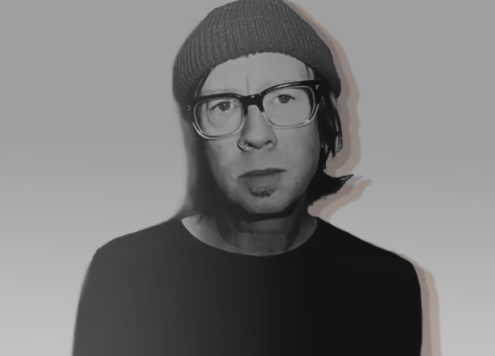
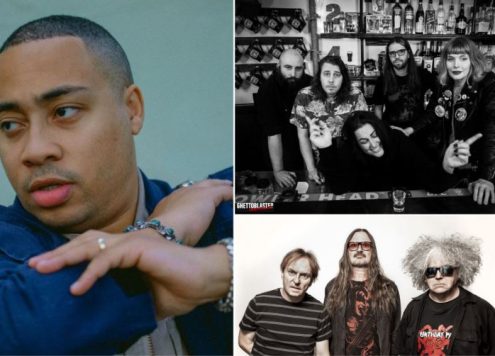
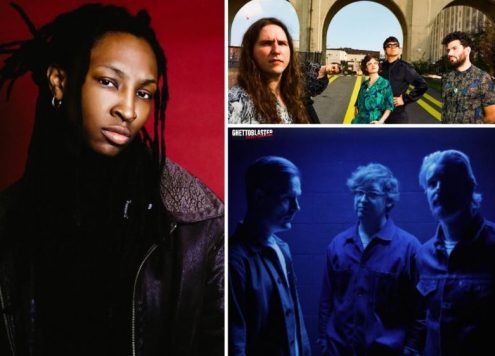


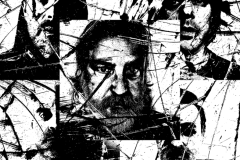
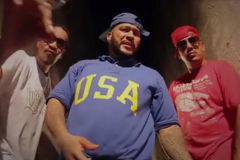
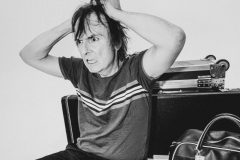

Social Media